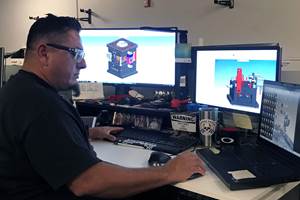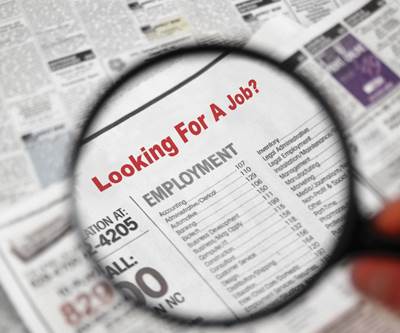The Bottom Line: Income Tax Nexus: Are You Protected?
Companies engaging in certain activities across state lines create a tax nexus, meaning that the company must pay income taxes in those states.
Are you trialing molds at customer locations in other states? If so, you may have engaged in an unprotected activity under Public Law 86-272. Therefore, you may be subject to income tax in the state where you have trialed the mold.
Trialing or sampling molds at customer locations in other states is just one of the activities that may result in the creation of nexus to states other than the one where a shop is based. A company creates a “nexus” with a state when that company has sufficient physical presence in the state for that state to subject the company to taxes.
Here are some recommended dos and don’ts when seeking protection under Public Law 86-272.
Public Law 86-272
The Interstate Income Act of 1959, more commonly known as Public Law 86-272, governs interstate commerce, or the sale of tangible personal property across state lines, and protects companies that engage in such interstate commerce (including molds) from additional taxes. However, protected activities are limited. Essentially, protection covers the mere solicitation of sales that occur outside of the state where a company is located. Protection does not cover activities like trialing or sampling molds.
Public Law 86-272 only provides immunity to the solicitation to sell personal property. Therefore, the law generally affords protection to molds, dies and other things that mold shops sell to their customers in other states. However, mold shops may be engaging in other types of activities that are not protected under this law. In those cases, mold shops create an income tax nexus to other states. If a mold builder creates an income tax nexus in another state, the mold builder may be required to file an income tax return in the state for which it has created the nexus.
The term “mere solicitation” is somewhat vague. In Wisconsin Department of Revenue v. William Wrigley, Jr., Co. (1992), the Supreme Court of the United States weighed in on its meaning by looking to various dictionary definitions. The court found that “mere solicitation” includes both explicit requests for orders and “any speech or conduct that implicitly invites an order.” Soliciting an order does not mean accepting or facilitating an order. Therefore, if mold shop employees are merely soliciting sales in other states, but they approve and fill the orders in the state where the mold shop is located, then Public Law 86-272 likely protects those activities.
If the law protects the activity, then the throwback rule applies to that sale. The throwback rule refers to sales that are taxed in the seller’s home state. Conversely, sales involving unprotected activities are not subject to the throwback rule, and may then be taxable in the state of the customer. In these instances, the mold builder must file an income tax return in the state of the customer.
Protected activities. These activities do not necessarily trigger income tax nexus, and may include the following:
- Soliciting orders for sales or advertising.
- Passing on orders to the home office.
- Coordinating shipment or delivery of new molds, without payment or other consideration.
- Carrying promotional materials for display or distribution.
- Exhibiting at trade shows, so long as orders are not accepted or facilitated.
- Recruiting or training sales personnel.
- Using personal property, such as cell phones, computers, or computer software to carry out protected solicitation.
Alone, these activities should not create an income tax nexus within a state, as the law deems them as mere solicitations of sales.
Unprotected activities. Public Law 86-272 does not protect these activities, which may include:
- Trialing of a new mold at the customer’s location.
- Approving or accepting orders.
- Securing deposits on the sale of a new mold.
- Providing warranty services or repairs to molds.
- Installing or hanging new molds.
- Providing technical assistance or service, such as engineering assistance or design services related to new molds. For example, mold builders should consider whether they are sending tooling engineers to a customer’s site outside of their state to assist in the design of a new mold.
- Conducting seminars or training courses on the technical use of a new mold.
- Shipping or delivering goods by means of company-owned trucks.
- Collecting delinquent accounts.
- Repossessing molds.
- Maintaining a parts department.
- Maintaining a warehouse or meeting place for employees.
- Maintaining a sales or technical office.
- Providing a telephone listing or other public listing within the state. For example, mold builders should consider whether contact information is listed on the website.
Generally, these unprotected activities will mean the mold shop has income tax nexus in the state in which the activity occurs. It is therefore likely that the law will require mold shops engaging in these activities to file an income tax return in that state.
Interstate Commerce. Public Law 86-272 does not apply to foreign entities. Although, many states may apply the same or similar standards in determining whether an entity must file an income tax return within its state. Also, companies that are incorporated under the laws of a state automatically have income tax nexus within the state and are required to file an income tax return in the company’s state of incorporation.
Protected and unprotected activities are determined on a year-by-year basis and many states apply these tests to unitary business groups. That is, the state will look to see if a related company performed any of the unprotected activities in determining whether a mold shop has nexus within its state. Of course, each state has its own nuances and case law. Therefore, a periodic state review of these tax matters is advisable.
Related Content
Making Mentoring Work | MMT Chat Part 2
Three of the TK Mold and Engineering team in Romeo, Michigan join me for Part 2 of this MMT Chat on mentorship by sharing how the AMBA’s Meet a Mentor Program works, lessons learned (and applied) and the way your shop can join this effort.
Read MoreMold Design Review: The Complete Checklist
Gerardo (Jerry) Miranda III, former global tooling manager for Oakley sunglasses, reshares his complete mold design checklist, an essential part of the product time and cost-to-market process.
Read MoreThe Role of Social Media in Manufacturing
Charles Daniels CFO of Wepco Plastics shares insights on the role of social media in manufacturing, how to improve the “business” side of a small mold shop and continually developing culture.
Read MoreEditorial Guidelines: Editorial Advisory Board
The Editorial Advisory Board of MoldMaking Technology is made up of authorities with expertise within their respective business, industry, technology and profession. Their role is to advise on timely issues, trends, advances in the field, offer editorial thought and direction, review and comment on specific articles and generally act as a sounding board and a conscience for the publication.
Read MoreRead Next
The Bottom Line: Hiring Tax Incentives
The Work Opportunity Tax Credit (WOTC) is a voluntary employment tax incentive program sponsored by the federal government since 1978.
Read MoreAre You a Moldmaker Considering 3D Printing? Consider the 3D Printing Workshop at NPE2024
Presentations will cover 3D printing for mold tooling, material innovation, product development, bridge production and full-scale, high-volume additive manufacturing.
Read MoreReasons to Use Fiber Lasers for Mold Cleaning
Fiber lasers offer a simplicity, speed, control and portability, minimizing mold cleaning risks.
Read More








.jpg;maxWidth=300;quality=90)












.jpg;maxWidth=970;quality=90)